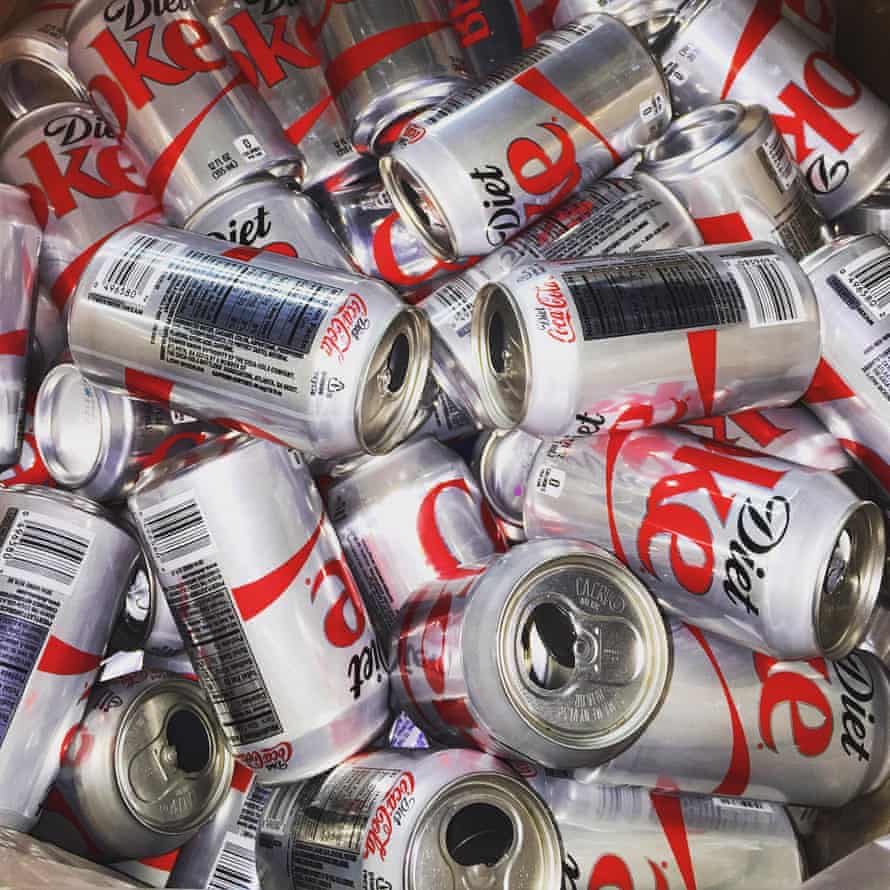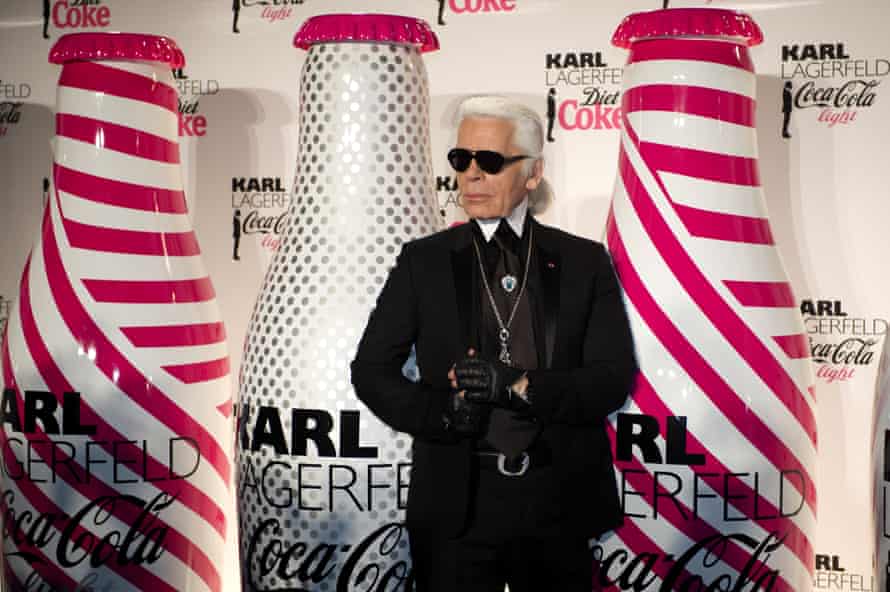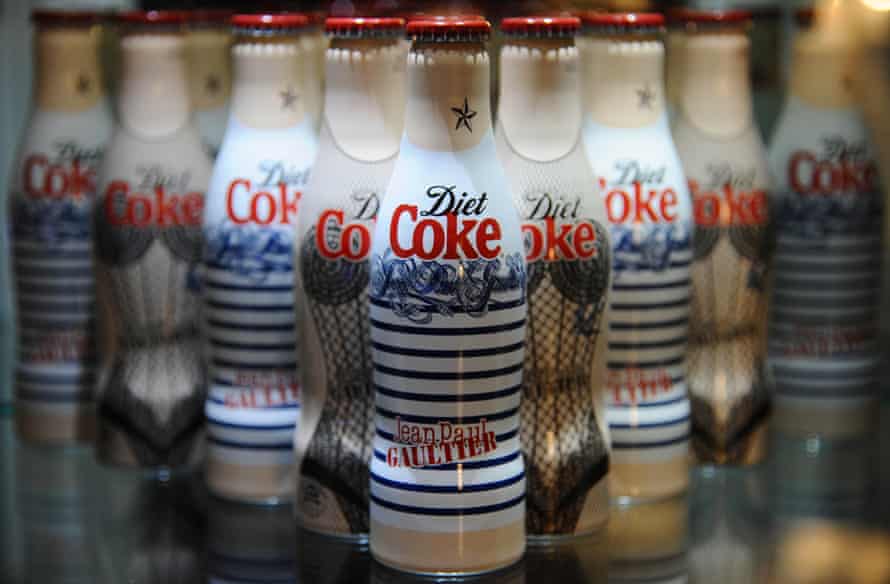I Didnt Like Coke. Why Do I Want to Do It Again
The greatest beloved story of my life has been with a carbonated beverage.
I tin can't remember a time when I wasn't addicted to Diet Coke. Some memories: I am sitting at the kitchen table at my grandmother's business firm in northern Cyprus, screaming because my mother won't refill my yellow-and-dark-green patterned glass. I am four or 5 years onetime. My grandmother looks on, disturbed, as I wail disconsolately. My female parent does not give in.
I am a teenage anorexic. After a long day starving myself, I walk to the corner shop and reward myself with a bottle of Nutrition Coke. (My mum won't buy information technology for the house any more, considering of my addiction.) My low blood sugar makes the artificial sweetness gustatory modality euphoric.
Information technology is my 30th birthday. I am at work at my former employer. To much fanfare, my boss brings in an 8-pack of Diet Coke, with a burning candle stuck in it. I am delighted.
I drinkable Diet Coke from the moment I wake up until I get to sleep. Five cans on a good day, vii cans on a bad day. My boyfriend jokes about my morning routine: wake up, pad to the kitchen. The sound of a can cracking; a hiss. Glug glug glug. Yes, every forenoon.
Using some back-of-a-fag-packet-maths, I judge that I take drunk 11,315 litres of Diet Coke in my 31 years on this Earth. (I take been conservative with these numbers – it is almost certainly more than.) That is more than than 11,000 litres of caramel fizz, fermenting my insides, bathing my liver in cream.
I actually desire to stop drinking Diet Coke – and non only considering I spend at least £500 a year on the stuff. It is embarrassing and bad for me. When I continue holiday, I fill up the supermarket trolley with Diet Coke, to the amusement of my friends. I get anxious if I don't accept any Diet Coke in the fridge as bedtime approaches; I run to the store in the eye of the night to ensure in that location is a common cold tin can waiting for me in the morning. I recently spent a twelvemonth on prescription medication for a stomach condition that was almost certainly triggered by my overconsumption of Diet Coke, according to my GP. If enduring an endoscopy won't end y'all drinking fizzy drinks, yous know you are fond.

To keep the costs downward, I buy 24-tin crates from my local supermarket. The staff know me there and remind me if I forget to choice up a crate. This is mortifying, but helpful.
I want to quit. I take to quit. I quit smoking in my 20s on my first endeavour, but Diet Coke is my aluminium Annapurna: I daren't even attempt the superlative. So I pitched this feature – generally as a way of holding myself accountable – and ready myself a target. By the end of January 2021, I would be Coke-free. If I am being honest with you, I didn't think I could exercise it myself.
My effort to quit Nutrition Coke does not start well. I finish my stockpile on New year's Eve, suckling from a ii-litre bottle like a baby drinking from the teat.
On New Year's Twenty-four hour period, I wake up hungover and watch Idiot box in bed with my boyfriend. We order pizza. "Add a can of Nutrition Coke," I instruct him. "I idea you were quitting?" he replies. My caput is pounding; merely the caramel smack of Diet Coke will do. "Order it," I say, my tone leaving no room for discussion. When it arrives, I down information technology, making piffling whimpering noises of pleasance.
The following day is worse. I notice myself craving Diet Coke in a style that is alarming and unexpected. I envisage a tiny role of my encephalon – roughly parallel with my tongue and upper palate – that won't become activated unless I drink Diet Coke. I want to dump a bucket of Diet Coke on this spot and watch it fizz. I know that my headache won't go away otherwise. I feel horrific.
This – according to Dr Sally Marlow of Male monarch's College London, a specialist in addiction and mental health – is because I am in concrete withdrawal from the caffeine in Diet Coke. The boilerplate can of Nutrition Coke contains 42mg of caffeine, the equivalent of roughly two-thirds of a shot of espresso. Caffeine is a medically recognised addictive substance that, when taken in excess, activates the brain'south reward circuitry. "The caffeine volition be stimulating neurotransmitter pathways, including dopamine," says Marlow. "Your brain has become used to having a certain amount of caffeine in it and, when you accept that abroad, you go through withdrawal. It's physical. You get crashing headaches."
Marlow confesses something unexpected: like me, she is a Diet Coke addict. "I managed to stop drinking it four years agone, but had to go cold turkey," she says. "I don't recollect it'south an option for me to take an occasional Diet Coke – it would rapidly escalate to 5 or six cans a mean solar day." It took her four attempts to kick the habit.
It is validating to hear an expert tell me that my Nutrition Coke addiction is only that, rather than a bad habit. "Oh, it's real," Marlow laughs. She explains that addiction has a biological component and a psychological component. The biological component is your body's physiological craving for an addictive substance, such equally caffeine, nicotine or booze. "The minute you become that substance into your body, your brain knows well-nigh information technology and gets a hitting from it," she says. "Over time, you develop a tolerance for the substance."

Marlow speculates that the bubbles in Diet Coke may increment the addictiveness of the potable. "This is just a theory, merely we know that, when a person drinks champagne, they absorb the alcohol faster than if information technology were a glass of wine, because the bubbles increment the surface area that delivers booze into the bloodstream," she says. "I wonder whether the bubbling in Diet Coke make you absorb the addictive substances in the drink faster."
In a argument on its website, Coca-Cola denies that its products are addictive. "Many people bask sweet tastes from fourth dimension to time, and that'southward normal … Regularly consuming food and beverage that sense of taste good and that you enjoy is not the same as being addicted to them … Caffeine is a mild stimulant, and if y'all have it regularly and and then stop abruptly, you may feel some headaches or other modest effects. Merely about of us tin reduce or eliminate caffeine from our diets without serious problems."
Then there is the psychological pull of a can of Diet Coke, something Marlow knows starting time-hand. "I would crack a can open and it was about similar Pavlov's dog," she says. "I'd anticipate having the Coke in my mouth. That'south the psychological attribute of the habit." She tells me that it takes 17 days to begin to kick an addiction. "The first few days are very intense," she says. "Hang in there."
I don't have the fortitude to do as she did – go cold turkey – so I improvise an extraction programme. I will taper myself off Diet Coke: 2 cans a twenty-four hour period for the showtime week, reducing to i can a day for the 2nd week and no cans thereafter. I run to the shop and buy an eight-pack. My mouth is watering as I deport information technology dwelling.
How did I get to the point where I found myself umbilically attached to a sugar-free carbonated drink?
Like many women, I was cruel to myself in my teens. I grew up in the 00s, when the torso-positivity movement was nonexistent. Rachel Zoe's tribe of identikit US size zero (United kingdom size four) waifs stalked the pages of every fashion magazine. Models spoke about subsisting on cigarettes and Diet Coke. "Cypher tastes equally skillful as skinny feels," said Kate Moss in 2009. I internalised that message wholeheartedly.
Every girl at my school aspired to exist as thin as possible. The toilets smelled of vomit. At lunch, groups of dieting girls – myself included – would walk arm in arm to the corner shop, skipping food to buy Diet Coke, which filled you up and had zero calories. Nutrition Coke denoted thinness and social cachet. We all wanted a taste.
Over time, I flirted with other soft drinks – Pepsi Max is a favourite, because it is slightly sweeter than Diet Coke – but I e'er found myself returning to my original love.

Nutrition Coke was launched in 1982, seven years before I was born. I grew up watching the Diet Coke Break adverts, featuring a group of businesswomen ogling a topless hunk. The Coca-Cola Company already had a diet drink – Tab – simply Diet Coke was marketed more smartly. "It has been a spectacular success since its launch," says Prof Robert Crawford, a marketing expert at RMIT University in Melbourne and the co-editor of Decoding Coca-Cola. "It tapped into the zeitgeist of its fourth dimension, which was professional person women making their mode in the workplace, looking good and feeling proficient. Information technology also reflects the fitness craze of the period."
In the 00s and 10s, Nutrition Coke leaned heavily into its association with the style globe, recruiting Jean Paul Gaultier and Karl Lagerfeld as artistic directors. More recently, equally the body-positivity movement has gained traction, Nutrition Coke has pivoted away from this association. Only as someone who grew up associating Diet Coke with skinny models, the imprint remains. To me, Diet Coke is diet culture in a can.
"I don't want to make you lot vanquish yourself upward fifty-fifty more," says Aisling Pigott of the British Dietetics Association, when I ask her to tell me why drinking so much diet soda is bad for me. I can take it, I say. She relents.
"It will cause tooth erosion and pb to fillings," says Pigott. My breadbasket volition too be taking a battering, as I know from personal experience. "You're at increased risk of gut ulcers, too as irritable bowel syndrome," she says. "And in that location are links betwixt carbonated drinks and reduced os density, significant yous're more at risk of getting fractures as you get older."
Although I was concerned about the wellness risks of aspartame, the sweetener in Nutrition Coke, Pigott tells me non to worry. "Aspartame is a heavily tested sweetener," she says. "There is no strong testify linking information technology to any health consequences." In the k scheme of things, Pigott says, Diet Coke isn't terrible. "It'south definitely a amend option than full-saccharide Coke. Only information technology'southward the amount you're having that is potentially harmful," she says.
The start week of my regime passes without incident. I join a Facebook support group for Diet Coke addicts who want to quit. It may just be my caffeine withdrawal fug, but I find the positivity I am receiving from strangers online so moving that I am close to tears.
"If I can do information technology, anyone tin can," ane recovering addict says. "You've got this!" Another tells me she had to get colitis to quit. "The hardest office is that it calls me," she writes. "I will never be free of that 'Mmm, Diet Coke' feeling. I beloved it."
"Me too, buddy," I recollect, upending a tin can to shake the final few drops into my mouth. "Me too."
W eek two of my tapered extraction plan. The first day is OK, but on mean solar day two I snap and drink iv cans. I hide the cans in the bottom of the recycling bin, hoping my fellow won't notice, only he had counted the cans in the fridge that forenoon. Rumbled.
It is humiliating, but the accountability helps keep me in check. I stick to i tin a day after that, but only by drinking more tea than I have drunk in my life. I wonder if I will go to the point where I similar the gustatory modality of water.
Co-ordinate to Anna Jezuita, a specialist alter counsellor, I'm being hard on myself. "Diet Coke has been your friend since you were 4," she says. "This is the Mount Everest of habitual behaviour. You can't just destroy it. What you need to exercise is wind down one habit and develop some other 1, so that, beside Mount Everest, y'all're edifice the modest pebbles of a new behaviour."
I tell Jezuita that I worry I am letting myself off too easily by not going cold turkey. "You know, in the due west, we're taught to retrieve of ourselves as inherently bad, similar there's something iffy and dirty about us and we take to be constantly kept in check," she says.
Jezuita helps me to calibrate my expectations to something more realistic – reduction, with the aim of stopping, just in a kinder and less self-loathing way. She besides encourages me to savour the taste of Nutrition Coke. "Really bask it," she says. "Every time you have a drink, sit downwards and permit the earth stop for a minute."
My morning Diet Coke speedily becomes the all-time part of my day – I require information technology in an animalistic way and I eke it out in tiny sips to make the precious cola final as long equally possible.
Week three: a week without Nutrition Coke. I anticipate this like I do a cervical smear, only with less enthusiasm. On my first day, I feel like I am going to cry. I miss it. I miss Diet Coke.
The hypnotherapist and habit specialist Jason Demant has helped people beat far tougher addictions. "Cocaine, alcohol, that sort of thing," he says. He probes my babyhood, my adolescence, the connections I make when I contemplate the supreme majesty of a can of Nutrition Coke. I explain the teenage eating disorder, filling up on Diet Coke instead of having luncheon. I am fully recovered, I explain, but Nutrition Coke has stayed in my life nevertheless.
"Do you often feel like you have to toe the rules in your life?" Demant asks. "Are y'all always a good person? Do yous always do the correct thing?"
Yes, I respond, slowly. I piece of work hard at my chore, I attempt to be a adept friend and partner, to eat well, to do. Diet Coke is the one thing where I think: fuck it. I am going to do what I want to practise, which is drink gallons of this stuff.
Demant explains that Nutrition Coke is triggering my inbuilt reward system, which is why I can't seem to let it get. "It's a suspension from the obligations of life. What you need to do is notice something else that gives you that feeling. What about, instead of rewarding yourself with Diet Coke, you could do things for yourself that felt loving?"
I incorporate modest gestures of self-intendance into my mean solar day. I spend more fourth dimension playing with my cat. I spotter trashy TV. I read in the bath. In the twilight menstruum betwixt brushing my teeth and going to bed, I listen to the hypnotherapy recording Demant sent me after our session. "You have no demand to drink Diet Coke," Demant intones over a gentle pianoforte soundtrack. Yes, I nod. I don't want it.
Something miraculous starts to happen. I stop thinking about Nutrition Coke. There is no longer whatever Diet Coke in my fridge – and it is OK. I don't miss it. To my astonishment, I lose a kilo. I am indifferent to the weight loss, but it is fascinating. Information technology suggests that the artificial sweetener in the Diet Coke was triggering my appetite for sweet things. (Studies have shown a link between drinking diet drinks and higher carbohydrate consumption.)
More than annihilation, I feel peaceful. "When you're addicted to something, your brain is always thinking nearly where you'll become the side by side hit," says Marlow. "Drinking 5 cans of Nutrition Coke takes upwards a huge amount of encephalon space." She is right: although I still remember almost Diet Coke, it doesn't consume my thoughts like information technology used to. I am not constantly monitoring how many cans I have in the fridge, or when I next need to practise a supermarket run.
Demant explains that I have to be watchful in the hereafter, and so I don't slip into old habits. "With any pattern that is compulsive or addictive, yous have to be on the watch all the time," says Demant. "Considering you may think: 'Oh, I've conquered this,' so 5 minutes subsequently you lot tin can go to the shop to buy Coke. Always be on guard." Marlow agrees. "What we know with most addictions is that people relapse when they retrieve they can accept merely 1," she says. "For many people, it'southward simply non possible. My communication is: don't think you can merely take one can. It'south not worth it." Marlow has not drunk a Diet Coke in v years.
It has been a month now and I no longer drink Diet Coke. When I take out the recycling, it doesn't sound similar a steel band at Notting Hill carnival. I drink water in the morning – and I similar the taste of information technology. I have swum out of the foaming caramel tide into an ocean of clear, clean sea: h2o all around me and not a drib of fizz to drinkable.
hestertrinsely1945.blogspot.com
Source: https://www.theguardian.com/food/2021/feb/02/the-real-thing-my-battle-to-beat-a-27-year-diet-coke-addiction